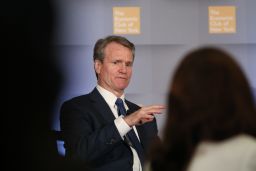The soft patch in the US economy is unlikely to morph into a full-blown recession, Bank of America CEO Brian Moynihan told CNN Business.
“The economy was predicted by everybody to slow down … That’s coming true,” Moynihan said in an exclusive interview from the sidelines of the Fortune Brainstorm Finance Conference in Montauk, New York. “The reality is we feel good about the economy.”
The Bank of America (BAC) CEO’s optimism is based on his bank’s view into consumer spending — the central driver of the American economy.
After robust growth in 2018, Bank of America’s customers have decelerated spending this year to pre-tax-cut levels.
However, Moynihan said spending is still consistent with 2% to 2.5% GDP growth.
“We feel very good that the consumer spending, the underlying activities are strong,” Moynihan said.

Overall, Bank of America doesn’t see signs that the US economy will contract for multiple quarters — the traditional definition of a recession.
“People talk about recession, and they confuse it with slowing down,” Moynihan said.
Moynihan’s comments support the recent rally near record highs in US stocks. But they contrast with the gloom-and-doom in other corners.
Sixty-nine percent of US CFOs surveyed by Duke University expect the United States will be in recession before the end of 2020.
A real-time economic monitor published by JPMorgan Chase (JPM) on Monday pegged the chance of a US recession within 12 months at 45%. That’s up from 39% a month ago. Billionaire Jeff Gundlach recently said he thinks there’s a significant change of a recession within just six months.
The bond market might be even more bearish. The yield curve — the gap between short and long-term yields — has inverted. In the past, that’s been a reliable recession indicator.
Making sense of upside-down rates
So which market is right — the bullish stock market or the bearish bond market?
“We’ll find out,” Moynihan said.
Although 10-year Treasury yields have suffered a “pretty dramatic fall” over the past few months and the yield curve has inverted, Moynihan said there could be more innocent explanations than a looming recession.
He pointed to negative interest rate policies in foreign central banks that has created $11 trillion of negative-yielding debt. That once-unthinkable situation has driven investors into US debt, which looks attractive because of the relative strength of the US economy.
“Of course, people want to come and get 2.07% for a Treasury bond here versus negative yields in other countries,” Moynihan said.
“The yield curve is going to be a reflection of all of that soup put together, it is not the cause of that soup,” he said.
In other words, the weird moves in the bond market won’t trigger a recession. They may just be a reflection of the bizarre world of negative interest rates.
Fed independence
Moynihan expressed strong support for the Federal Reserve, which is facing intense political pressure as it navigates these confusing signals.
Asked about President Donald Trump’s refusal to rule out demoting Fed chief Jerome Powell, Moynihan said it’s critical that the market can trust the Fed makes decisions solely on the facts.
“The Fed’s independence is one of the greatest things this country has,” Moynihan said.

























